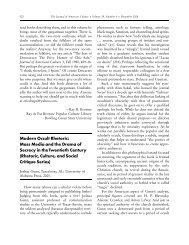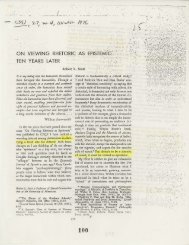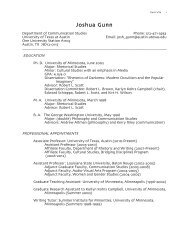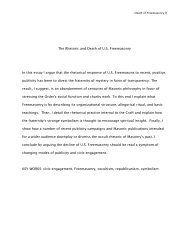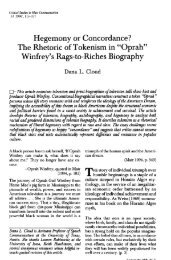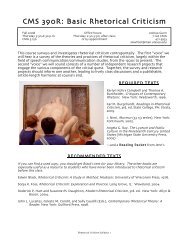Here is a draft of that cover letter
Here is a draft of that cover letter
Here is a draft of that cover letter
You also want an ePaper? Increase the reach of your titles
YUMPU automatically turns print PDFs into web optimized ePapers that Google loves.
eprinting them should not be an <strong>is</strong>sue (if accepted for publication, I'm uncertain<br />
if they will need to be captioned with credits).<br />
Reviewer X's Suggestion<br />
3. The first objection reviewer X voices <strong>is</strong> at the level <strong>of</strong> method: the theoretical<br />
approach taken uses the case study <strong>of</strong> Long, not so much to illuminate a<br />
h<strong>is</strong>torically specific d<strong>is</strong>course as much as further prop the theory. In other words,<br />
I see what I want to see because my reading prefigures the d<strong>is</strong>course with<br />
psychoanalytic categories.<br />
Th<strong>is</strong> <strong>is</strong> an important and valuable insight <strong>that</strong>, I regret, no rev<strong>is</strong>ion could<br />
overcome without substantially extending the d<strong>is</strong>cussion. Within the overall<br />
context <strong>of</strong> the reviewer's remarks, the object seems rooted in a particular<br />
methodological (and ideological) commitment: <strong>that</strong> one approaches texts or<br />
d<strong>is</strong>course without preconceived notions or categories, and then, on the bas<strong>is</strong> <strong>of</strong><br />
"close reading" or working through the intricacies <strong>of</strong> the d<strong>is</strong>course, selects <strong>that</strong><br />
theoretical perspective <strong>that</strong> the d<strong>is</strong>course seems to recommend (I recall th<strong>is</strong> <strong>is</strong><br />
sometimes referred to as the "organic" approach to critic<strong>is</strong>m).<br />
Although I was trained in th<strong>is</strong> approach, th<strong>is</strong> essay comes at d<strong>is</strong>course from a sort<br />
<strong>of</strong> "mid-level" theoretical approach akin to genre critic<strong>is</strong>m (and therefore suffers<br />
similar objections). In my view, Lacanian categories have more to do with<br />
Burke's understanding <strong>of</strong> "form" than termin<strong>is</strong>tic screens: on the bas<strong>is</strong> <strong>of</strong> clinical<br />
experience psychoanalysts have seen a number <strong>of</strong> "patterns" or things occurring<br />
among patients <strong>that</strong> yield pleasure. From th<strong>is</strong> empirical bas<strong>is</strong>, a number <strong>of</strong><br />
psychical structures were defined and d<strong>is</strong>cerned and amended over time. The<br />
structures <strong>of</strong> neuros<strong>is</strong>, like <strong>that</strong> <strong>of</strong>, say, a genre, seem to evince a repeated<br />
movement (or seeming causation)—but the particularities <strong>of</strong> th<strong>is</strong> movement, as<br />
well as their unique form <strong>of</strong> expression, differ from one individual or d<strong>is</strong>course<br />
from the next. So, to borrow Edwin Black's terms, "The [psychoanalytic critic's]<br />
training and experience instruct him in where to look, but not in what to see." My<br />
dec<strong>is</strong>ion to use Lacanian concepts to understand Long's appeal came after I saw<br />
him deliver a speech on a video documentary; I immediately thought he was<br />
"hysterical," and originally my analys<strong>is</strong> pursed <strong>that</strong> idea. After studying Long, I<br />
changed my mind to the opposing pole: in th<strong>is</strong> sense my familiarity with<br />
psychoanalys<strong>is</strong> taught me where to look, just not what I was going to see.<br />
In short: th<strong>is</strong> objection <strong>is</strong> the objection <strong>that</strong> many psychoanalytic approaches to<br />
rhetorical phenomena have and will likely meet. It <strong>is</strong> my hope <strong>that</strong> by abandoning<br />
the specification <strong>of</strong> "method" and focusing, instead, on how the notion <strong>of</strong> desire<br />
better explains the appeal <strong>of</strong> demagogic rhetoric, I can persuade reviewer X to "go<br />
along for the ride" even if she d<strong>is</strong>agrees with my failure to let the text dictate the<br />
method. Indeed, a psychoanalytic approach to texts <strong>of</strong>fers an alternative to the<br />
"organic" approach, while not abandoning the necessity <strong>of</strong> h<strong>is</strong>torical specificity<br />
and context.



